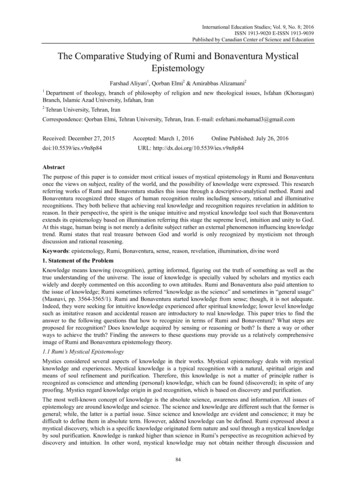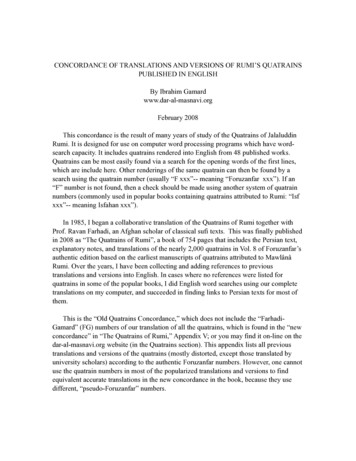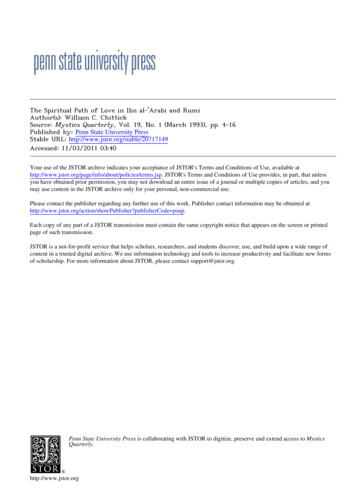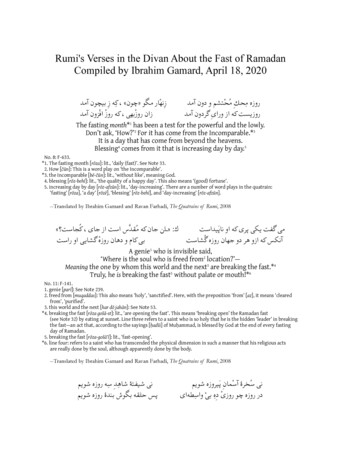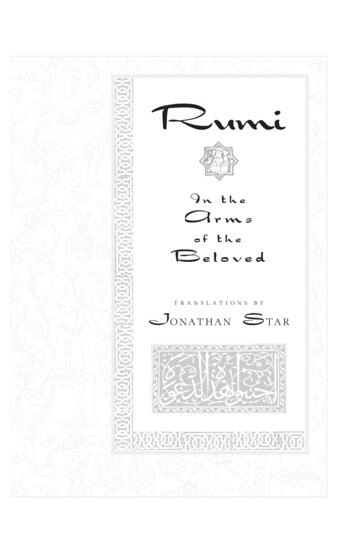
Transcription
RumiIn theAr m sof theBe l o v e dT R A N S L A T I O N SB YJO N A T H A N S T A R
Rumi
Th e Ta r c h e r C o r n e r s t o n e E d i t i o n sTao Te Chingby Lao Tzu, translated by Jonathan StarThe Essential Marcus Aureliusnewly translated and introducedby Jacob Needleman and John P. PiazzaAccept This Gift: Selections from A Course in Miraclesedited by Frances Vaughan, Ph.D., and Roger Walsh, M.D., Ph.D.,foreword by Marianne WilliamsonThe Kybalionby Three InitiatesThe Spiritual EmersonEssential Works by Ralph Waldo Emersonintroduction by Jacob NeedlemanThe Four GospelsThe Contemporary English Versionforeword by Phyllis TickleThe Hermetica: The Lost Wisdom of the PharaohsTimothy Freke and Peter GandyRumi: In the Arms of the Belovedtranslations by Jonathan Star
J e r e m y P. Ta r c h e r /Pe n g u i n , a m e m b e r o fPe n g u i n G r o u p ( U S A ) I n c .N e w Yo r k
RumiIn theAr m sof theBe l o v e dT R A N S L A T I O N SB YJO N A T H A N S T A R
I would like to thank all those people who have supported this offering withtheir love and enthusiasm. Special thanks go to Shahram Shiva for supplyingliteral translations of the quatrains, and to all the people at Jeremy P.Tarcher for the care and honor that they extended to these words.J E R E M YP .T A R C H E R / P E N G U I NPublished by the Penguin GroupPenguin Group (USA) Inc., 375 Hudson Street, New York, New York 10014,USA Penguin Group (Canada), 90 Eglinton Avenue East, Suite 700, Toronto,Ontario M4P 2Y3, Canada (a division of Pearson Canada Inc.) Penguin Books Ltd,80 Strand, London WC2R 0RL, England Penguin Ireland, 25 St Stephen’s Green,Dublin 2, Ireland (a division of Penguin Books Ltd) Penguin Group (Australia),250 Camberwell Road, Camberwell, Victoria 3124, Australia (a division of PearsonAustralia Group Pty Ltd) Penguin Books India Pvt Ltd, 11 Community Centre,Panchsheel Park, New Delhi–110 017, India Penguin Group (NZ), 67 Apollo Drive,Rosedale, North Shore 0632, New Zealand (a division of Pearson New Zealand Ltd) Penguin Books (South Africa) (Pty) Ltd, 24 Sturdee Avenue, Rosebank,Johannesburg 2196, South AfricaPenguin Books Ltd, Registered Offices:80 Strand, London WC2R 0RL, EnglandCopyright 1997 by Jonathan StarAll rights reserved. No part of this book may be reproduced, scanned,or distributed in any printed or electronic form without permission.Please do not participate in or encourage piracy of copyrighted materialsin violation of the author’s rights. Purchase only authorized editions.Library of Congress Cataloging-in-Publication DataJalal al-Din Rumi, Maulana, 1207–1273.[Selections. English. 2008]Rumi : in the arms of the beloved / translations by Jonathan Star.p.cm.Includes index.ISBN: 1-4406-5883-81. Sufi poetry, Persian—Translations into English. I. Star, Jonathan. II. ook design by Deborah KernerWhile the author has made every effort to provide accurate telephone numbers andInternet addresses at the time of publication, neither the publisher nor the author assumesany responsibility for errors, or for changes that occur after publication. Further, thepublisher does not have any control over and does not assume any responsibility for authoror third-party websites or their content.
To onewho wearsthe robes of fire
Contents Introduction M M x iPart One.To Us Return M M 1Part Two.The Beloved M M 2 3Part Three.An Endless CelebrationM M 5 1Part Four.The Cauldron of Love M M 8 7Part Five.A Mine of Rubies M M 1 1 7Part Six.The Bliss of Union M M 1 6 5Part Seven.Stories M M 1 8 7Terms and Symbolism M M 1 9 5Sources M M 2 0 3Index M M 2 0 5
Introduction here is a voice in us all that is ever-present,a voice that always sings its melody to theworld. This is the voice of truth and certainty, the voice that lays bare the hidden mysteries ofthe soul. In a burst of inspiration, the German poetRainer Maria Rilke heard this voice and wrote for threedays “in a single breathless obedience . . . without oneword being in doubt or having to be changed.”This inspired state that opens up the vistas of theuniverse—one we glimpse only at peak moments in ourlife—is the same state that poet-saints live in all thetime. That is why their every word is charged withpurity and divine refulgence; their poetry is a reflectionof their own perfect state. Jalaluddin Rumi was sucha poet-saint. For thirty years poetry issued from hislips, infused with such genius and perfection as to beliehuman origin. He was a pure instrument of the Divine,a flute upon which God played an exquisite song. Inone of his quatrains, Rumi writes:Do you think I know what I’m doing,That for a moment, or even half a moment,I know what verses will come from my mouth?I am no more than a pen in a writer’s hand,No more than a ball smacked around by a polo stick!
Rumi’s “breathless obedience” to that inner voiceis what made him a peerless master of ecstatic verse.The Islamic scholar A. J. Arberry writes, “In Rumi weencounter one of the world’s greatest poets. In profundity of thought, inventiveness of image, and triumphant mastery of language, he stands out as thesupreme genius of Islamic mysticism.” And R. A.Nicholson, who dedicated his life to Islamic studies,called Rumi “the greatest mystical poet of any age.”The poetic and mystical achievement of Jalaluddin Rumi is a monument in the annals of spiritual literature. In his vast outpouring he not only captured thewhole of Islamic mysticism but polished it, refined it,and transformed it into a thing of exquisite beauty. Themost personal experiences are cast in the light of universal truths; the ordinary life of man—crowded, busy,and full of uncertainty—is shown to be a necessary stepon one’s journey to the ineffable Absolute. Rumi hasgiven every word life; and everyone who reads him beholds the naked words of the soul clothed in livingform. In Rumi we hear the pure voice of love—we hearthe intimate whispers of lover and beloved, we feel thejoyous heart gliding upon the water of its own melting.S y m b o l s o f G ra c exiiSufi poetry is filled with metaphors, the moststriking of which revolve around wine, taverns, anddrunkenness. In this symbolic language of love, “wine”represents the divine love that intoxicates the soul;“getting drunk” means losing oneself in that love; the“cup” refers to one’s body and mind; and the Saaqi (theCupbearer, the Maiden who pours the wine) is thegrace-bestowing aspect of God that fills the soul’s
empty cup with the wine of love. The Sufis even have aword for “hangover” which suggests the lingering effects of love.These metaphors of drunkenness are, more thananything else, a call to experience; they reflect the Sufisentiment that the immediate experience of God is farmore crucial than any kind of objective or learnedknowledge. In a verse from his famous Rubá’iyát,Omar Khayyám writes:The cover on the wine-vat is happierthan the empire of King Jamshid,The wine more fragrant than a great feast,The first sigh of a drunk lover’s heartmore blessed than the song of the greatest poet.Although Rumi employed the macabre and bacchanalian symbolism of his tradition, his more endearing themes were based on symbols related to nature. Inhis poetic verse, the nightingale represents the soul; therose is the perfect beauty of God; the rosegarden is paradise; and the breeze is God’s life-giving breath. Whenwe hear of Winter, it is a soul separated from God;when we hear of Spring, it is union, resurrection, andrebirth. All the elements of nature that come alive inSpring are the outward signs of the soul’s inner awakening: the rising Sun is the illumination of divineknowledge, the “festival of color” is the beauty of thesoul’s awakening, and the warm rain is the pouringdown of God’s grace. The Sun had a special significance for Rumi because italluded to his master, Shams—the one who awakenedxiii
the truth within Rumi. Rumi’s use of the terms“Shams,” “Shams-e Tabriz” (Shams of Tabriz), and“Shamsuddin” refers not only to his master but also tothe many aspects of the Beloved, embodied in Shams:“Shams” symbolizes the power of grace, the power thatawakens the truth within us; “Shams” symbolizes theinner sunrise, the inner light of consciousness, one’sown soul and its awakening. Rumi writes:O my soul, where can I find restbut in the shimmering love of his heart?Where can I see the pure light of the Sunbut in the eyes of my own Shams-e Tabriz?Th e M e e t i n g o f Two O c e a n sxivBy all accounts, Rumi lived a grand and illustrious life—he was a respected teacher, a master of Sufilore, the head of a university in the Anatolian capitalcity of Konya (in present-day Turkey). At the age ofthirty-four he claimed hundreds of disciples, the kingbeing one of them. And what is so remarkable and unforgettable about Rumi’s life is that in one moment allthis changed—the moment he met a wandering darvishnamed Shams-e Tabriz.There are several accounts of this historic meeting. One version says that during a lecture of Rumi’s,Shams came in and dumped all of Rumi’s books—onehandwritten by his own father—into a pool of water.Rumi thought the books were destroyed, but Shamsretrieved them, volume by volume, intact. Anotherversion says that at a wave of Shams’ hand, Rumi’sbooks were engulfed in flames and burned to ashes.Shams then put his hand in the ashes and pulled out
the books. (A story much like the first.) A third account says that Rumi was riding on a mule through asquare in the center of Konya. A crowd of eager students walked by his feet. Suddenly a strange figuredressed in black fur approached Rumi, grabbed hold ofhis mule’s bridle, and said: “O scholar of infiniteknowledge, who was greater, Muhammad or Bayazid ofBestam?” This seemed like an absurd question since, inall of Islam, Muhammad was held supreme among allthe prophets. Rumi replied, “How can you ask such aquestion?—No one can compare with Muhammad.”“O then,” Shams asked, “why did Muhammad say,‘We have not known Thee, O God, as thou should beknown,’ whereas Bayazid said, ‘Glory unto me! I knowthe full glory of God?’ ”With this one simple question—and with thepiercing gaze of Shams’ eyes—Rumi’s entire view ofreality changed. The question was merely an excuse.Shams’ imparting of an inner awakening is what shattered Rumi’s world. The truths and assumptions uponwhich Rumi based his whole life crumbled. This samestory is told symbolically in the first two accounts,whereby Rumi’s books—representing all his acquiredintellectual knowledge, including the knowledge givento him by his father—are destroyed, and then miraculously retrieved or “resurrected” by Shams. The bookscoming from the ashes, created anew by Shams, represent the replacing of Rumi’s book-learned knowledge(and his lofty regard for such knowledge) with divineknowledge and the direct experience of God.According to an embellished version of this thirdaccount, after Shams’ question, Rumi entered a mystical state of ego annihilation that the Sufis call fana.When he regained consciousness, he looked at Shamsxv
xviwith utter amazement, realizing that this was no ordinary darvish, but the Beloved himself in human form.From that moment on, Rumi’s life was never again thesame. He took Shams to live in his home and the twomen were inseparable; they spent hours a day together,sometimes isolating themselves for long periods to prayand fast in divine communion with God.About this meeting, Rumi’s son Sultan Waladwrote: “After meeting Shams, my father danced all dayand sang all night. He had been a scholar—he became apoet. He had been an ascetic—he became drunk withlove.”Rumi was totally lost in this newfound love thathis master revealed, and all his great attainments wereblossoming through that love. Every day was a miracle,a new birth for Rumi’s soul. He had found the Beloved,he had finally been shown the glory of his own soul.Then, suddenly, eighteen months after Shams entered Rumi’s life, he was gone. He returned some timelater, for a brief period, and then he was gone again forever. Some accounts say that Shams left in the middle ofthe night and that Rumi wandered in search of him fortwo years. (Perhaps a symbolic and romantic portrayalof the lover in search of his missing Beloved.) Other accounts report that Shams was murdered by Rumi’s jealous disciples (symbolizing how one’s desires and lowertendencies can destroy the thing held most dear).Without Shams, Rumi found himself in a state ofutter and incurable despair; and his whole life thereafter became one of longing and divine remembrance.Rumi’s emptiness was that of a person who has just losta husband or a wife, or a dear friend. Rumi’s storyshows us that the longing and emptiness we feel for alost loved one is only a reflection, a hologram, of the
longing we feel for God; it is the longing we feel to become whole again, the longing to return to the rootfrom which we were cut. (Rumi uses the metaphor of areed cut from a reed bed and then made into a flute—which becomes a symbol of a human separated from itssource, the Beloved. And as the reed flute wails all day,telling about its separation from the reed bed, so Rumiwails all day telling about being separated from hisBeloved.)It was Shams’ disappearance, however, that ignited the fire of longing within Rumi; and it was thisvery longing that brought him the glorious union withthe Beloved. Years later Rumi wrote: “It is the burn ofthe heart that I want. It is this burning which is everything—more precious than a worldly empire—becauseit calls God secretly in the night.”Th e Pa t h o f L o veIn Rumi’s poetry, love is the soul of the universe,and this soul knows no bounds—it embraces all people,all countries, and all religions. The goal of Sufism isto know love in all of its glorious forms; and everyprophet, every practice, and every form of worship thatleads toward love is, in essence, Sufism. The great Sufiphilosopher Ibn Arabi writes:My
Rumi thought the books were destroyed, but Shams retrieved them, volume by volume, intact. Another version says that at a wave of Shams’ hand, Rumi’s books were engulfed in flames and burned to ashes. xiv Shams then put his hand in the ashes and pulled out. the books. (A story much like the first.) A third ac- count says that Rumi was riding on a mule through a square in the center of .

